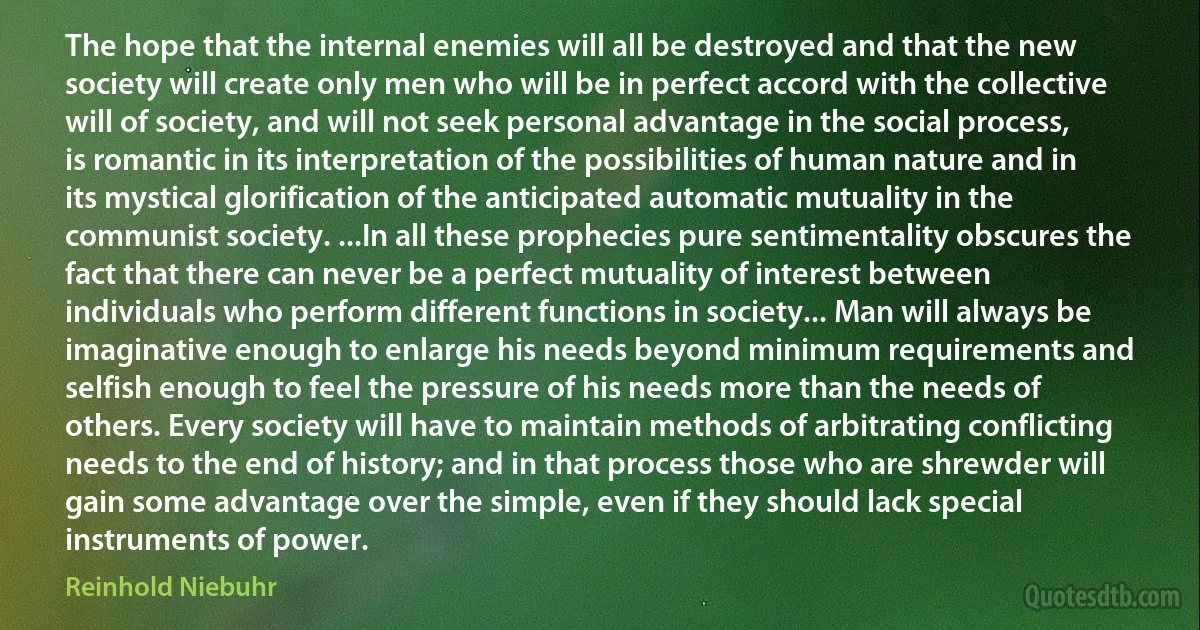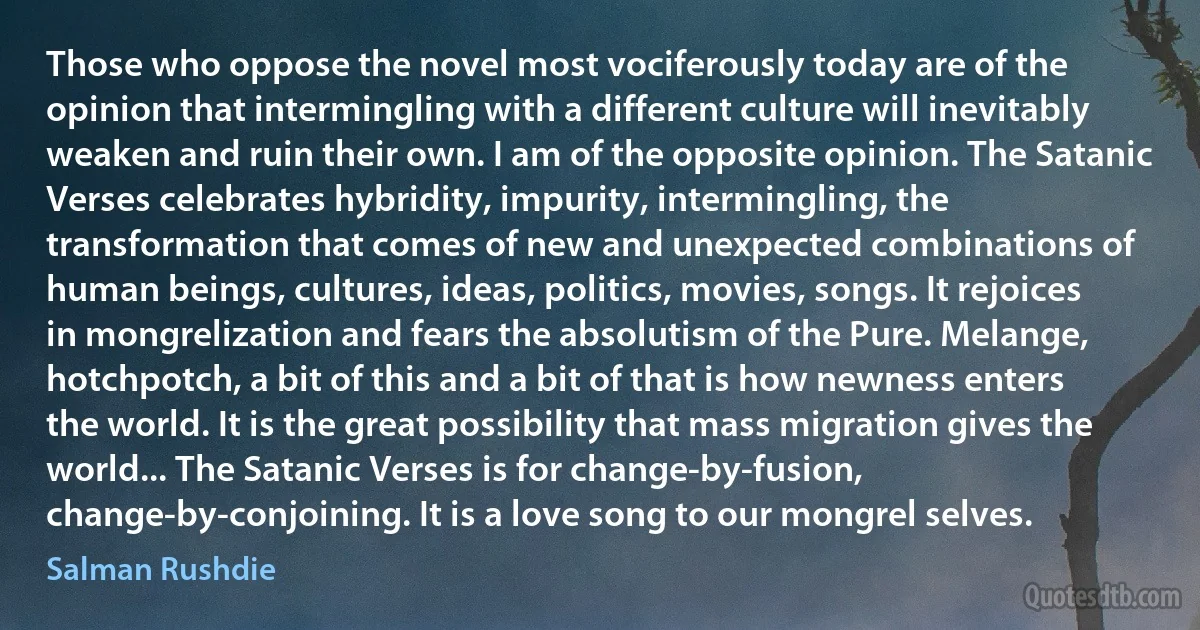Pure Quotes - page 82
Her intense and pure religiousness took the form of her having equal faith in the existence of another world and in the impossibility of comprehending it in terms of earthly life. All one could do was to glimpse, amid the haze and the chimeras, something real ahead, just as persons endowed with an unusual persistence of diurnal cerebration are able to perceive in their deepest sleep, somewhere beyond the throes of an entangled and inept nightmare, the ordered reality of the waking hour.

Vladimir Nabokov
Man is encompassed with a dome of incomprehensible wonders. In him and about him is that which should fill his life with majesty and sacredness. Something of sublimity and sanctity has thus flashed down from heaven into the heart of every one that lives. There is no being so base and abandoned but hath some traits of that sacredness left upon him; something, so much perhaps in discordance with his general repute, that he hides it from all around him; some sanctuary in his soul, where no one may enter; some sacred inclosure, where the memory of a child is, or the image of a venerated parent, or the remembrance of a pure love, or the echo of some word of kindness once spoken to him; an echo that will never die away.

Albert Pike
Nobody can divide a factory's income among thousands of people, without some sort of a gauge to measure people's value. Her gauge was bootlicking. Selfless? In her father's time, all of his money wouldn't have given him a chance to speak to his lousiest wiper and get away with it, as she spoke to our best skilled workers and their wives. She had pale eyes that looked fishy, cold and dead. And if you ever want to see pure evil, you should have seen the way her eyes glinted when she watched some man who'd talked back to her once and who'd just heard his name on the list of those getting nothing above basic pittance. And when you saw it, you saw the real motive of any person who's ever preached the slogan: 'From each according to his ability, to each according to his need'.

John Galt
As I visualize it, the business of the future will be a scientific, social and economic unit. It will be vigorously creative in pure science where its contributions will compare with those of the universities... the machinist will be proud of and informed about the company's scientific advances; the scientist will enjoy the reduction to practice of his basic perceptions. ... year by year our national scene would change in the way, I think, all Americans dream of. Each individual will be a member of a group small enough so that he feels a full participant in the purpose and activity of the group. His voice will be heard and his individuality recognized.

Edwin H. Land
Reason is feminine in nature; it can only give after it has received. Of itself it has nothing but the empty forms of its operation. There is no absolutely pure rational knowledge except the four principles to which I have attributed metalogical truth; the principles of identity, contradiction, excluded middle, and sufficient reason of knowledge. For even the rest of logic is not absolutely pure rational knowledge. It presupposes the relations and the combinations of the spheres of concepts. But concepts in general only exist after experience of ideas of perception, and as their whole nature consists in their relation to these, it is clear that they presuppose them.

Arthur Schopenhauer
Boundless compassion for all living beings is the surest and most certain guarantee of pure moral conduct, and needs no casuistry. Whoever is filled with it will assuredly injure no one, do harm to no one, encroach on no man's rights; he will rather have regard for every one, forgive every one, help every one as far as he can, and all his actions will bear the stamp of justice and loving-kindness. ... In former times the English plays used to finish with a petition for the King. The old Indian dramas close with these words: "May all living beings be delivered from pain." Tastes differ; but in my opinion there is no more beautiful prayer than this.

Arthur Schopenhauer
Sir Isaac Newton, renowned inventor of the milled-edge coin and the catflap!"
"The what?" said Richard.
"The catflap! A device of the utmost cunning, perspicuity and invention. It is a door within a door, you see, a ..."
"Yes," said Richard, "there was also the small matter of gravity."
"Gravity," said Dirk with a slightly dismissive shrug, "yes, there was that as well, I suppose. Though that, of course, was merely a discovery. It was there to be discovered." ...
"You see?" he said dropping his cigarette butt, "They even keep it on at weekends. Someone was bound to notice sooner or later. But the catflap ... ah, there is a very different matter. Invention, pure creative invention. It is a door within a door, you see.

Douglas Adams
We agree that pure and unstained religion ought to be the highest of all cares appertaining to public regiment: as well in regard of that aid and protection which they who faithfully serve God confess they receive at his merciful hands; as also for the force which religion hath to qualify all sorts of men, and to make them in public affairs the more serviceable, governors the apter to rule with conscience, inferiors for conscience sake the willinger to obey. It is no peculiar conceit, but a matter of sound consequence, that all duties are by so much the better performed, by how much the men are more religious from whose abilities the same proceed. For if the course of politic affairs cannot in any good sort go forward without fit instruments, and that which fitteth them be their virtues, let Polity acknowledge itself indebted to Religion; godliness being the chiefest top and wellspring of all true virtues, even as God is of all good things.

Richard Hooker
Every day, as the work went on, the Virgin was present, directing the architects, and it is this direction that we are going to study, if you have now got a realising sense of what it meant. Without this sense, the church is dead. Most persons of a deeply religious nature would tell you emphatically that nine churches out of ten actually were dead-born, after the thirteenth century, and that church architecture became a pure matter of mechanism or mathematics; but that is a question for you to decide when you come to it; and the pleasure consists not in seeing the death, but in feeling the life.

Henry Adams
S. Clement of Alexandria says quite bluntly, after alluding to the Mysteries: "Even now I fear, as it is said, 'to cast the pearls before swine, lest they tread them underfoot, and turn and rend us.' For it is difficult to exhibit the really pure and transparent words respecting the true Light to swinish and untrained hearers." (Clarke's Ante-Nicene Christian Library, Vol. IV. Clement of Alexandria. Stromata, bk. I., ch. xii.)

Annie Besant
But leaving aside disputes as to what may be to us "happiness” in a future separated from our present by millions of years, so that we are no more fitted now to formulate its conditions than is a child, playing with its dolls, to formulate the deeper joys and interests of its maturity, let us understand that, according to the teachings of the Esoteric Philosophy, the Devachanī is surrounded by all he loved on earth, with pure affection, and the union being on the plane of the Ego, not on the physical plane, it is free from all the sufferings which would be inevitable were the Devachanī present in consciousness on the physical plane with all its illusory and transitory joys and sorrows. It is surrounded by its beloved in the higher consciousness, but is not agonised by the knowledge of what they are suffering in the lower consciousness, held in the bonds of the flesh.

Annie Besant
It is in love that religion exists and not in ceremony, in the pure and sincere love in the heart. Unless a man is pure in body and mind, his coming into a temple and worshipping Shiva is useless. The prayers of those that are pure in mind and body will be answered by Shiva, and those that are impure and yet try to teach religion to others will fail in the end. External worship is only a symbol of internal worship; but internal worship and purity are the real things. Without them, external worship would be of no avail. Therefore you must all try to remember this.
People have become so degraded in this Kali Yuga that they think they can do anything, and then they can go to a holy place, and their sins will be forgiven. If a man goes with an impure mind into a temple, he adds to the sins that he had already, and goes home a worse man than when he left it.

Swami Vivekananda
It was contrary to his habit to finish at one painting, and he used to say that a poet who improvises cannot hope to form pure verses. But of i condiments ' in the shape of last retouches he was particularly fond. Now and then he would model the light into half tint with a rub of his finger; or with a touch of his thumb he would dab a spot of dark pigment into some corner to strengthen it ; or throw in a reddish stroke-a tear of blood, so to speak-to break the parts superficially. In fact, when finishing, he painted much more with his fingers than with his brush.

Titian
Camus dealt with the question best. He said that he liked individuals who take sides more than literatures that do. 'One either serves the whole of man or does not serve him at all. And if man needs bread and justice, and if what has to be done must be done to serve this need, he also needs pure beauty which is the bread of his heart.' So Camus called for 'Courage in and talent in one's work.' And Márquez redefined tender fiction thus: The best way a writer can serve a revolution is to write as well as he can.
I believe that these two statements might be the credo for all of us who write. They do not resolve the conflicts that have come, and will continue to come, to contemporary writers. But they state plainly an honest possibility of doing so, they turn the face of the writer squarely to her and his existence, the reason to be, as a writer, and the reason to be, as a responsible human, acting, like any other, within a social context.

Nadine Gordimer
Yoga is defined as a method – the process of nirodha (mental control) – by which union (the goal of yoga) is achieved. Yoga is therefore both the process of nirodha and the unqualified state of niruddha (the perfection of that process). The word yoga (union) implies duality (as in joining of two things or principles); the result of yoga is the nondual state..., or as the union of the lower self and higher Self. The nondual state is characterized by the absence of individuality; it can be described as eternal peace, pure love, Self-realization, or liberation.

Baba Hari Dass
Schlesinger had written the Kennedy campaign's anti-biography of Nixon for the election of 1960, and had come to the view that he was "the greatest shit in 20th century American politics (the "20th century” bit is pure scholarly caution; I cannot at the moment think of anyone in the 19th century quite meeting Nixon's combination of sanctimoniousness and squalor).”.

Christopher Hitchens
When H. L. Mencken unpacks his idiomatic brasses, tunes up his verbal strings, and gets in readiness his phrasal wood winds to orchestrate a fugue in damnation or in praise of man, god or book, his all too meagre audience cancels all other engagements to be on hand at the initial presentation. The result, that audience knows, will be an experience of pure enjoyment. His musicianship is unfailing. His program is unsatisfactory only in its impermanence. Though the theme he proposes is invariably Mencken - Mencken apropos of this or that - he gives it infinite and intricate variations.

Burton Rascoe
Do American faces so often look so lost because they are most tragically trapped between a very real dread of coming alive to something more than merely existing, and an equal dread of going down to the grave without having done more than merely be comfortable? If so, this is the truly American disease. And would account in part for the fact that we lead the world today in insanity, criminality, alcoholism, narcoticism, psychoanalysm, cancer, homicide and perversion in sex as well as in perversion just for the pure hell of the thing. Never on the earth of man has he lived so tidily as here amidst such psychological disorder. Never has any people lived so hygienically while daily dousing itself with the ritual slops of guilt. Nowhere has any people set itself a moral code so rigid while applying it quite so flexibly.

Nelson Algren
What am I in the eyes of most people - a nonentity, an eccentric, or an unpleasant person - somebody who has no position in society and will never have; in short, the lowest of the low. All right, then - even if that were absolutely true, then I should one day like to show by my work what such an eccentric, such a nobody, has in his heart.
That is my ambition, based less on resentment than on love in spite of everything, based more on a feeling of serenity than on passion.
Though I am often in the depths of misery, there is still calmness, pure harmony and music inside me. I see paintings or drawings in the poorest cottages, in the dirtiest corners. And my mind is driven towards these things with an irresistible momentum.

Vincent van Gogh



